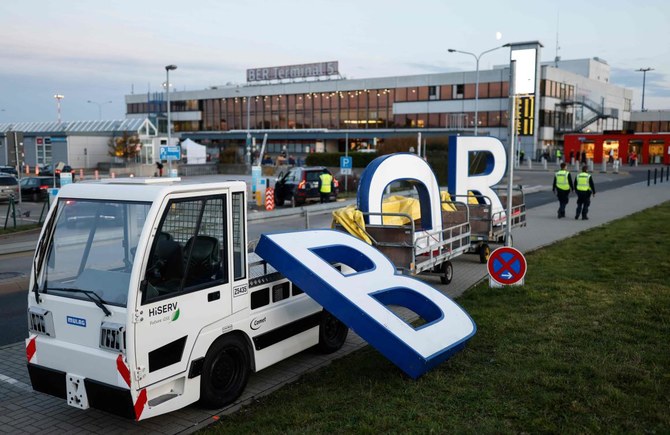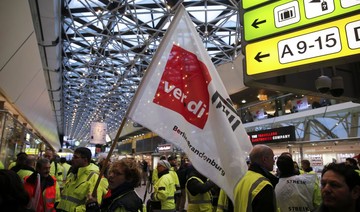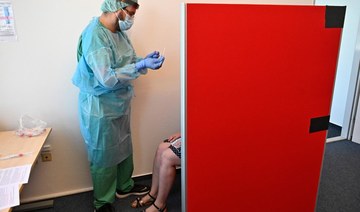BERLIN: Nine years late and eye-wateringly over budget, the Berlin region’s new international airport will finally open on Saturday — in the middle of a global pandemic that has crippled air travel.
“We are ready for take-off!” insists the management team at the new Berlin Brandenburg Airport (BER), set to replace the German capital’s aging Tegel and Schoenefeld airports.
But the mood is one of relief rather than celebration.
Ever since construction began on BER in 2006, the project has been dogged by one failure after another, becoming a financial black hole and a national laughing stock — not exactly an example of German efficiency.
The airport, located in the south-east of the capital, was originally due to open in 2011.
Now it is opening its doors in the middle of the worst crisis the aviation industry has ever seen, as COVID-19 restrictions continue to suffocate air travel.
And as if that were not enough, there’s also the climate crisis: pressure group Extinction Rebellion is planning acts of “civil disobedience” on the opening day to protest against the impact of aviation on global warming.
Against that backdrop, “We will simply open, we will not have a party,” according to Engelbert Luetke Daldrup, president of the airport’s management company.
Lufthansa and EasyJet will be the first two airlines to touch down on the tarmac of what will be Germany’s third-largest airport, after Frankfurt and Munich.
A few days before the opening, around 200 staff were busy disinfecting the 360,000-square-meter Terminal 1.
Some 100 alcoholic hand gel dispensers have been installed and robot vacuum cleaners hum over the floors.
The “Magic Carpet,” a huge, bright red artwork by American artist Pae White suspended from the ceiling, brings a touch of color to the check-in hall.
The airport has been designed to welcome 27 million passengers a year, but in November it will see only 20 percent of usual air traffic thanks to the pandemic.
Terminal 2 won’t open until spring 2021.
About 15 shops and restaurants out of just over 100 will remain shut, while the rest will be forced to keep “limited opening hours” because of low traffic through the airport, a spokesman said
None of this good news for BER, initially projected to cost $2 billion but already past the $7.6 billion.
The airport has been granted $353 billion in state aid to help safeguard the jobs of the 20,000 people who will eventually work there until the end of 2020.
The health crisis is already having an impact on employment at the hub: at the end of July, Berlin’s airports announced the loss of 400 jobs out of a total of 2,100.
EasyJet has said it will cut 418 jobs in the German capital, and Europe’s leading airline Lufthansa, Germany’s flagship carrier, is to shed 30,000 jobs worldwide.
“We fear even greater job losses in the future,” a spokesman for the Verdi union said.
Luetke Daldrup hopes the situation will improve “from the spring onwards.” But the International Air Transport Association does not expect global air traffic to reach pre-crisis levels until 2024.
In the state of Brandenburg, which surrounds Berlin, local leaders remain optimistic about the prospects for development.
“No hotel has so far postponed its investment plans because of the pandemic,” insists Olaf Luecke, president of the local branch of Germany’s hotel and catering trade union (DEHOGA).
Construction work began in September on two 14,000-square-meter (150,000-square-foot) hotel complexes, due to open in 2022.
And in anticipation of the opening of BER, US electric-car giant Tesla has chosen Brandenburg as the location of its first European factory, which is set to employ 40,000 people.
“Having new, modern infrastructure will be beneficial in any case, despite the pandemic,” according to Carsten Broenstrup of the state employers’ association.
But “if there is not a vaccine soon, it will be a very big problem,” he admits.
Berlin’s ill-fated new airport finally ready for take-off
https://arab.news/bh8cc
Berlin’s ill-fated new airport finally ready for take-off

- The airport, located in the south-east of the capital, was originally due to open in 2011
- BER initially projected to cost $2 billion but already was past the $7.6 billion mark
Open Forum Riyadh to discuss digital currency, AI, and mental health

- The event will run in parallel to the WEF’s Special Meeting on Global Collaboration
LONDON: The Open Forum Riyadh — a series of public sessions taking place in the Saudi capital on Sunday and Monday — will “spotlight global challenges and opportunities,” according to the organizers.
The event, a collaboration between the World Economic Forum and the Saudi Ministry of Economy and Planning, will run in parallel to the WEF’s Special Meeting on Global Collaboration, Growth and Energy for Development, taking place in Riyadh on April 28 and 29.
“Under Saudi Vision 2030, Riyadh has become a global capital for thought leadership, action and solutions, fostering the exchange of knowledge and innovative ideas,” Faisal F. Alibrahim, Saudi minister of economy and planning, said in a press release, adding that this year’s Open Forum being hosted in Riyadh “is a testament to the city’s growing influence and role on the international stage.”
The forum is open to the public and “aims to facilitate dialogue between thought leaders and the broader public on a range of topics, including environmental challenges, mental health, digital currencies, artificial intelligence, the role of the arts in society, modern-day entrepreneurship, and smart cities,” according to a statement.
The agenda includes sessions addressing the impact of digital currencies in the Middle East, the role of culture in public diplomacy, urban development for smart cities, and actions to enhance mental wellbeing worldwide.
The annual Open Forum was established in 2003 with the goal of enabling a broader audience to participate in the activities of the WEF, and has been hosted in several different countries, including Cambodia, India, Jordan and Vietnam.
The panels will feature government officials, artists, civil-society leaders, entrepreneurs, and CEOs of multinationals.
This year’s speakers include Yazeed A. Al-Humied, deputy governor and head of MENA investments at the Saudi Pubic Investment Fund; Princess Reema Bandar Al-Saud, Saudi Arabia’s ambassador to the US; and Princess Beatrice, founder of the Big Change Charitable Trust and a member of the British royal family.
Michele Mischler, head of Swiss public affairs and sustainability at the WEF, said in a press release that the participation of the public in Open Forum sessions “fosters diverse perspectives, enriches global dialogue, and empowers collective solutions for a more inclusive and sustainable future.”
Meituan looks to hire in Saudi Arabia, indicating food delivery expansion

SHANGHAI: Chinese food delivery giant Meituan is seeking to hire staff for at least eight positions based in Riyadh, in a sign it may be looking to Saudi Arabia to further its global expansion ambitions, according to Reuters.
The jobs ads, which is hiring for KeeTa, the brand name Meituan uses for its food delivery operations in Hong Kong, is seeking candidates with expertise in business development, user acquisition, and customer retention, according to posts seen by Reuters on Linkedin and on Middle Eastern jobs site Bayt.com.
Meituan did not immediately respond to a request for comment by Reuters on its plans for Saudi expansion.
Bloomberg reported earlier on Friday that the Beijing-based firm would make its Middle East debut with Riyadh as the first stop.
Since expanding to Hong Kong in May 2023, Meituan’s first foray outside of mainland China, speculation has persisted that its overseas march would continue as the firm searches for growth opportunities, with the Middle East rumored since last year to be one area of possible expansion.
“We are actively evaluating opportunities in other markets,“ Meituan CEO Wang Xing said during a post-earnings call with analysts last month.
“We have the tech know-how and operational know-how, so we are quietly confident we can enter a new market and find an approach that works for consumers there.”
IMF opens first MENA office in Riyadh

RIYADH: The International Monetary Fund has opened its first office the Middle East and North Africa region in Riyadh.
The office was launched during the Joint Regional Conference on Industrial Policy for Diversification, jointly organized by the IMF and the Ministry of Finance, on April 24.
The new office aims to strengthen capacity building, regional surveillance, and outreach to foster stability, growth, and regional integration, thereby promoting partnerships in the Middle East and beyond, according to the Saudi Press Agency.
Additionally, the office will facilitate closer collaboration between the IMF and regional institutions, governments, and other stakeholders, the SPA report noted, adding that the IMF expressed its appreciation to Saudi Arabia for its financial contribution aimed at enhancing capacity development in its member countries, including fragile states.
Abdoul Aziz Wane, a seasoned IMF director with an extensive understanding of the institution and a broad network of policymakers and academics worldwide, will serve as the first director of the Riyadh office.
Saudi minister to deliver keynote speech at Automechanika Riyadh conference

RIYADH: Saudi Arabia’s Deputy Minister of Investment Transaction Saleh Al-Khabti is set to deliver the keynote speech at a global automotive aftermarket industry conference in Riyadh.
Set to be held from April 30 April to May 2 in the Saudi capital’s International Convention and Exhibition Center, Automechanika Riyadh will welcome more than 340 exhibitors from over 25 countries.
Al-Khabti will make the marquee address on the first day of the event, which will also see participation from Aftab Ahmed, chief advisor for the Automotive Cluster at the National Industrial Development Centre, Ministry of Industry and Mineral Resources.
Saudi Arabia’s automotive sector is undergoing a transformation, with the Kingdom’s Public Investment Fund becoming the major shareholder in US-based electric vehicle manufacturer Lucid, and also striking a deal with Hyundai to collaborate on the construction of a $500 million-manufacturing facility.
Alongside this, Saudi Arabia’s Crown Prince Mohammed bin Salman launched the Kingdom’s first electric vehicle brand in November 2022.
Commenting on the upcoming trade show, Bilal Al-Barmawi, CEO and founder of 1st Arabia Trade Shows & Conferences, said: “It is a great honor for Automechanika Riyadh to be held under the patronage of the Saudi Arabian Ministry of Investment, and we’re grateful for their continued support as the event goes from strength-to-strength.
“The insights and support we’ve already received have been invaluable, and we look forward to continuing this relationship throughout the event and beyond.”
This edition of Automechanika Riyadh will feature seven product focus areas, including parts and components, tyres and batteries, and oils and lubricants.
Accessories and customizing, diagnostics and repairs, and body and paint will also be discussed, as well as care and wash.
Aly Hefny, show manager for Automechanika Riyadh, Messe Frankfurt Middle East, said: “The caliber of speakers confirmed to take part at Automechanika Riyadh is a testament to the event’s growth and prominence within the regional automotive market.
“We have developed a show that goes beyond the norm by providing a platform that supports knowledge sharing and networking while promoting the opportunity to engage with key industry experts and hear the latest developments, trends and innovations changing the dynamics of the automotive sector.”
Aramco-backed S-Oil expects Q2 refining margins to remain steady then trend upward

SEOUL: South Korea’s S-Oil forecast on Friday that second-quarter refining margins will be steady, supported by regular maintenance in the region, then trend upward in tandem with higher demand as the summer season gets underway, according to Reuters.
Over the January-March period, the refiner said it operated the crude distillation units at its 669,000-barrel-per-day oil refinery in the southeastern city of Ulsan at 91.9 percent of capacity, compared with 94 percent in October-December.
S-Oil, whose main shareholder is Saudi Aramco, plans to shut its No. 1 crude distillation unit sometime this year for maintenance, the company said in an earnings presentation, without specifying the time.


















